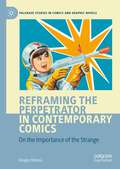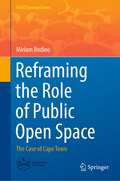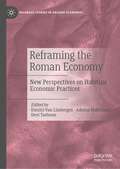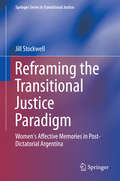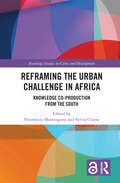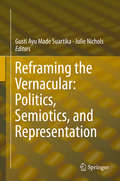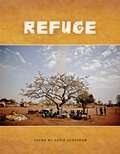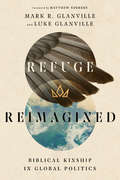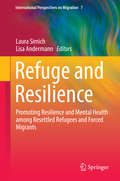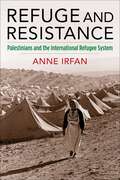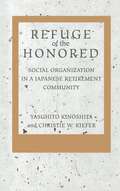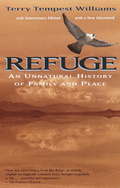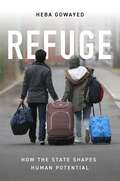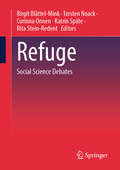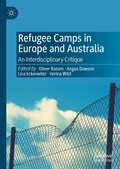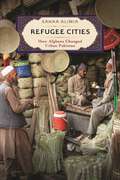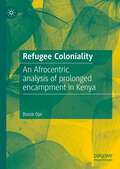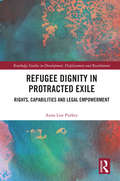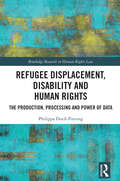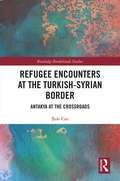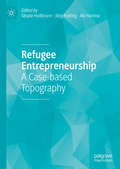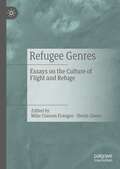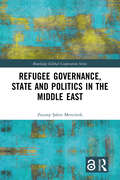- Table View
- List View
Reframing the Perpetrator in Contemporary Comics: On the Importance of the Strange (Palgrave Studies in Comics and Graphic Novels)
by Dragoș ManeaThis book foregrounds the figure of the perpetrator in a selection of British, American, and Canadian comics and explores questions related to remembrance, justice, and historical debt. Its primary focus is on works that deliberately estrange the figure of the perpetrator—through fantasy, absurdism, formal ambiguity, or provocative rewriting—and thus allow readers to engage anew with the history of genocide, mass murder, and sexual violence. This book is particularly interested in the ethical space such an engagement calls into being: in its ability to allow us to ponder the privilege many of us now enjoy, the gross historical injustices that have secured it, and the debt we owe to people long dead.
Reframing the Role of Public Open Space: The Case of Cape Town (PoliTO Springer Series)
by Miriam BodinoThis book explores the growing spatial inequality in contemporary cities, and the opportunity of reframing the role of public open space as a tool of inclusion in a context of an increasing economic gap between the urban poor and rich. The first part outlines the geographical and theoretical frames of reference, which are then tested in the analysis of a case study: Cape Town. This city in South Africa was selected since its spatial aspects of separation are particularly evident due to the legacy of both apartheid and modernism. The examination of the policies of the City of Cape Town confirms the rising attention to public space since the 1990s. This slow progress of desegregation is tested through a critical study of one of the most disadvantaged areas of the city, Khayelitsha. The book explores the relevance and impact of an urban-design project, and reframes the role of public open space not only as a tool for restructuring the apartheid city, but also for reinterpreting other fragmented contemporary cities.
Reframing the Roman Economy: New Perspectives on Habitual Economic Practices (Palgrave Studies in Ancient Economies)
by Dimitri Van Limbergen Adeline Hoffelinck Devi TaelmanThis book focuses on those features of the Roman economy that are less traceable in text and archaeology, and as a consequence remain largely underexplored in contemporary scholarship. By reincorporating, for the first time, these long-obscured practices in mainstream scholarly discourses, this book offers a more complete and balanced view of an economic system that for too long has mostly been studied through its macro-economic and large-scale – and thus archaeologically and textually omnipresent – aspects. The topic is approached in five thematic sections, covering unusual actors and perspectives, unusual places of production, exigent landscapes of exploitation, less-visible products and artefacts, and divergent views on emblematic economic spheres. To this purpose, the book brings together a select group of leading scholars and promising early career researchers in archaeology and ancient economic history, well positioned to steer this ill-developed but fundamental field of the Roman economy in promising new directions.
Reframing the Transitional Justice Paradigm
by Jill StockwellThis volume explores the evolving and complex memorial consequences of state-sponsored violence in post-dictatorial Argentina. Specifically, it looks at the power and significance of personal emotions and affects in shaping memorial culture. This volume contends that we need to look beyond political and ideological contestations to a deeper level of how memorial cultures are formed and sustained. It argues that we cannot account for the politics of memory in modern-day Argentina without acknowledging and exploring the role played by individual emotions and affects in generating and shaping collective emotions and affects. Drawing from direct testimony from Argentinian women who have experienced political and physical violence, the research in this volume aims at understanding how their memories may be a different source of insight into the deep animosities within and between Argentine memorial cultures. In direct contrast to the nominally objective and universalist sensibility that traditionally has driven transitional justice endeavours, this volume examines how affective memories of trauma are a potentially disruptive power within the reconciliation paradigm--and thus affect should be taken into account when considering transitional justice. Accordingly, Cultures of Remembrance for Women in Post-Dictatorial Argentina is an excellent resource for those interested in human rights, transitional justice, clinical psychology and social work, and Latin American conflicts.
Reframing the Urban Challenge in Africa: Knowledge Co-production from the South (Routledge Studies in Cities and Development)
by Ntombini Marrengane Sylvia CroeseThis book explores the changing dynamics and challenges behind the rapid expanse of Africa’s urban population. Africa’s urban age is underway. With the world’s fastest growing urban population, the continent is rapidly transforming from one that is largely rural, to one that is largely urban. Often facing limited budgets, those tasked with managing African cities require empirical evidence on the nature of demands for infrastructure, escalating environmental hazards, and ever-expanding informal settlements. Drawing on the work of the African Urban Research Initiative, this book brings together contributions from local researchers investigating key themes and challenges within their own contexts. An important example of urban knowledge coproduction, the book demonstrates the regional diversity that can be seen as the main feature of African urbanism, with even well-accepted concepts such as informality manifesting in markedly different ways from place to place. Providing an important nuanced perspective on the heterogeneity of African cities and the challenges they face, this book will be an important resource for researchers across development studies, African studies, and urban studies.
Reframing the Vernacular: Politics, Semiotics, and Representation
by Gusti Ayu Made Suartika Julie NicholsThe aim of this book is to reflect on ''vernacularity'' and culture. It concentrates on two major domains: first it attempts to reframe our understanding of vernacularity by addressing the subject in the context of globalisation, cross-disciplinarity, and development, and second, it discusses the phenomenon of how vernacularity has been treated, used, employed, manipulated, practiced, maintained, learned, reconstructed, preserved and conserved, at the level of individual and community experience. Scholars from a wide variety of knowledge fields have participated in enriching and engaging discussions, as to how both domains can be addressed. To expedite these aims, this book adopts the theme "Reframing the Vernacular: Politics, Semiotics, and Representation",organised around the following major sub-themes: • Transformation in the vernacular built environment • Vernacular architecture and representation • The meaning of home • Symbolic intervention and interpretation of vernacularity • The semiotics of place • The politics of ethnicity and settlement • Global tourism and its impacts on vernacular settlement • Vernacular built form and aesthetics • Technology and construction in vernacular built forms • Vernacular language - writing and oral traditions
Refuge
by Adrie KusserowDeeply cross cultural, humanitarian, political and global poems about how humans deal with suffering across the world. These are poems about cultures rubbing up against each other, war, refugees, child soldiers, spiritual refugees trying to find a home, and a mother who is witnessing these firsthand. Rare ethnographic poetry by a world traveling cultural anthropologist and human rights activist.
Refuge (American Poets Continuum)
by Adrie KusserowDeeply cross cultural, humanitarian, political and global poems about how humans deal with suffering across the world. These are poems about cultures rubbing up against each other, war, refugees, child soldiers, spiritual refugees trying to find a home, and a mother who is witnessing these firsthand. Rare ethnographic poetry by a world traveling cultural anthropologist and human rights activist.
Refuge Reimagined: Biblical Kinship in Global Politics
by Luke Glanville Mark R. GlanvilleThe global crisis of forced displacement is growing every year. At the same time, Western Christians' sympathy toward refugees is increasingly overshadowed by concerns about personal and national security, economics, and culture. We urgently need a perspective that understands both Scripture and current political realities and that can be applied at the levels of the church, the nation, and the globe. In Refuge Reimagined, Mark R. Glanville and Luke Glanville offer a new approach to compassion for displaced people: a biblical ethic of kinship. God's people, they argue, are consistently called to extend kinship—a mutual responsibility and solidarity—to those who are marginalized and without a home. Drawing on their respective expertise in Old Testament studies and international relations, the two brothers engage a range of disciplines to demonstrate how this ethic is consistently conveyed throughout the Bible and can be practically embodied today. Glanville and Glanville apply the kinship ethic to issues such as the current mission of the church, national identity and sovereignty, and possibilities for a cooperative global response to the refugee crisis. Challenging the fear-based ethic that often motivates Christian approaches, they envision a more generous, creative, and hopeful way forward. Refuge Reimagined will equip students, activists, and anyone interested in refugee issues to understand the biblical model for communities and how it can transform our world.
Refuge and Resilience
by Laura Simich Lisa AndermannTaking an interdisciplinary approach and focusing on the social and psychological resources that promote resilience among forced migrants, this book presents theory and evidence about what keeps refugees healthy during resettlement. The book draws on contributions from cultural psychiatry, anthropology, ethics, nursing, psychiatric epidemiology, sociology and social work. Concern about immigrant mental health and social integration in resettlement countries has given rise to public debates that challenge scientists and policy makers to assemble facts and solutions to perceived problems. Since the 1980s, refugee mental health research has been productive but arguably overly-focused on mental disorders and problems rather than solutions. Social science perspectives are not well integrated with medical science and treatment, which is at odds with social reality and underlies inadequacy and fragmentation in policy and service delivery. Research and practice that contribute to positive refugee mental health from Canada and the U. S. show that refugee mental health promotion must take into account social and policy contexts of immigration and health care in addition to medical issues. Despite traumatic experiences, most refugees are not mentally ill in a clinical sense and those who do need medical attention often do not receive appropriate care. As recent studies show, social and cultural determinants of health may play a larger role in refugee health and adaptation outcomes than do biological factors or pre-migration experiences. This book's goal therefore is to broaden the refugee mental health field with social and cultural perspectives on resilience and mental health.
Refuge and Resistance: Palestinians and the International Refugee System (Columbia Studies in International and Global History)
by Anne IrfanIn the decades after World War II, the United Nations established a global refugee regime that became central to the lives of displaced people around the world. This regime has exerted particular authority over Palestinian refugees, who are served by a specialized UN body, the Relief and Works Agency (UNRWA). Formed shortly after the 1948 war, UNRWA continues to provide quasi-state services such as education and health care to Palestinian refugee communities in the Middle East today.This book is a groundbreaking international history of Palestinian refugee politics. Anne Irfan traces the history and politics of UNRWA’s interactions with Palestinian communities, particularly in the refugee camps where it functioned as a surrogate state. She shows how Palestinian refugees invoked internationalist norms to demand their political rights while resisting the UN’s categorization of their plight as an apolitical humanitarian issue. Refuge and Resistance foregrounds how nonelite activism shaped the Palestinian campaign for international recognition, showing that engagement with world politics was driven as much by the refugee grass roots as by the upper echelons of the Palestine Liberation Organization. It demonstrates that refugee groups are important actors in global politics, not simply aid recipients.Recasting modern Palestinian history through the lens of refugee camps and communities, Refuge and Resistance offers vital new perspectives for understanding politics beyond the nation-state.
Refuge of the Honored: Social Organization in a Japanese Retirement Community
by Yasuhito Kinoshita Christie W. KieferFaced with the decline of the traditional family and the explosive growth of the over-65 population, the Japanese are looking for new ways to care for their elders. This timely study documents the birth of a major social phenomenon in Japan—the planned retirement community.In the mid-1980s, Yasuhito Kinoshita spent a year living in Japan's first such community, Fuji-no-Sato. His collaboration with Christie W. Kiefer, a cultural gerontologist, is the first detailed study of a retirement community in a non-Western culture.Fuji-no-Sato is a social community with no visible traditions. Kinoshita and Kiefer show that its residents' preference for long-established relationships creates the need for the invention of relationships that have no precedent in Japanese society.This book reveals much about Japanese culture, and about the "graying of society" that plagues the newly industrialized countries of Asia. Its lessons about sensitivity to the elderly's values and the need for clear communication have important applications in other cultures as well.
Refuge: An Unnatural History of Family and Place
by Terry Tempest WilliamsIn the spring of 1983 Terry Tempest Williams learned that her mother was dying of cancer. That same season, The Great Salt Lake began to rise to record heights, threatening the herons, owls, and snowy egrets that Williams, a poet and naturalist, had come to gauge her life by. One event was nature at its most random, the other a by-product of rogue technology: Terry's mother, and Terry herself, had been exposed to the fallout of atomic bomb tests in the 1950s. As it interweaves these narratives of dying and accommodation, Refuge transforms tragedy into a document of renewal and spiritual grace, resulting in a work that has become a classic.From the Trade Paperback edition.
Refuge: How the State Shapes Human Potential
by Heba GowayedHow states deny the full potential of refugees as people and perpetuate social inequalityAs the world confronts the largest refugee crisis since World War II, wealthy countries are being called upon to open their doors to the displaced, with the assumption that this will restore their prospects for a bright future. Refuge follows Syrians who fled a brutal war in their homeland as they attempt to rebuild in countries of resettlement and asylum. Their experiences reveal that these destination countries are not saviors; they can deny newcomers’ potential by failing to recognize their abilities and invest in the tools they need to prosper.Heba Gowayed spent three years documenting the strikingly divergent journeys of Syrian families from similar economic and social backgrounds during their crucial first years of resettlement in the United States and Canada and asylum in Germany. All three countries offer a legal solution to displacement, while simultaneously minoritizing newcomers through policies that fail to recognize their histories, aspirations, and personhood. The United States stands out for its emphasis on “self-sufficiency” that integrates refugees into American poverty, which, by design, is populated by people of color and marked by stagnation. Gowayed argues that refugee human capital is less an attribute of newcomers than a product of the same racist welfare systems that have long shaped the contours of national belonging.Centering the human experience of displacement, Refuge shines needed light on how countries structure the potential of people, new arrivals or otherwise, within their borders.
Refuge: Social Science Debates
by Birgit Blättel-Mink Katrin Späte Torsten Noack Corinna Onnen Rita Stein-RedentThe welcome culture of 2015 in Germany has, not least due to the (re)definition of safe countries of origin, turned into a deportation policy. How can this change in policy be understood and is it also accompanied by a change of attitude among the population? Which reasons for and which reasons against the admission of refugees are cited in social debates? This volume brings together analyses of the social discourse on dealing with refugees, questions of labour market integration and the practice of counselling refugees. Alongside academic analyses are reflective contributions from the practice of migration policy.With contributions by Olaf Struck.- David Stiller.- Helge Döring and Sebastian Kurtenbach.- Ann-Christine Lill, Janis Schneider and Sam Schneider.- Kirsten Hoesch. - Kathrin Weis.- Theresa Köhler and Kerstin Ettl.- Doris Beer.- André Pohlmann.- Katharina Resch, Gertraud Kremsner, Michelle Proyer, Camilla Pellech, Regina Studener-Kuras and Gottfried Biewe.The editors: Prof. Dr. Birgit Blättel-Mink is Professor of Sociology with a focus on industrial and organizational sociology at the Goethe University in Frankfurt/Main. Torsten Noack, M.A. Sociology, Head of the School for Work Education of the International Federation Stuttgart. Prof. Dr. Corinna Onnen is university professor for general sociology at the University of Vechta. Dr. Katrin Späte works at the Institute for Sociology at the University of Münster. Apl. Prof. Dr. Rita Stein-Redent works at the University of Vechta.
Refugee Camps in Europe and Australia: An Interdisciplinary Critique
by Angus Dawson Oliver Razum Lisa Eckenwiler Verina WildThis Palgrave Pivot examines refugee camps in the EU, Australia, and their border zones. The approach is interdisciplinary, comprising perspectives of history, ethics, political science, literature, and health. The book argues that current practice of accommodating refugees is arbitrary and disempowering, ranging from strict regulation within nation states to detrimental conditions in extraterritorial camps. It instead proposes to increase public scrutiny of refugee camps, to enforce existing laws, and to endorse ethical place-making. With its contributions from a wide range of fields, this edited volume will be of interest to academics and students in public health, ethics, sociology, politics, and related fields.
Refugee Children: Towards the Next Horizon
by Charles WattersThe last twenty years have seen unprecedented numbers of refugee children entering Western countries. Many of these children will have experienced the atrocities of war and issues concerning their care and treatment are high on the agenda of research bodies, policy makers and service providers. Refugee Children is the first book to offer a wide ranging analysis of the context of care and the measures taken by nation states and intergovernmental bodies to address perceived problems. Drawing on a detailed examination of practices, the book outlines a model of good practice in the care of refugee children. Topics covered include: the treatment of asylum seeking children at the borders of industrialised countries reception, psycho-social problems, social capital, education, and issues relating to cultural diversity and integration a critical analysis of responses to these problems including the development of special programmes for refugee children, elements of good practice in the field the transfer of good practice between countries implications for the development of services and academic research in this vital area. With a series of case studies examining practices from a number of countries, Refugee Children makes a vital contribution both to the social care literature in this field and to theory and research in refugee and migration studies. As such it is essential reading for academic researchers in a range of disciplines including social policy, education, migration and refugee studies as well as service providers in health care, social care, housing and education. Charles Watters is Director of the European Centre for the Study of Migration and Social Care in the School of Social Policy, Sociology and Social Research at the University of Kent.
Refugee Cities: How Afghans Changed Urban Pakistan
by Dr. Sanaa AlimiaSituated between the 1970s Soviet Union’s invasion of Afghanistan and the post–2001 War on Terror, Refugee Cities tells the story of how global wars affect everyday life for Afghans who have been living as refugees in Pakistan. This book provides a necessary glimpse of what ordinary life looks like for a long-term refugee population, beyond the headlines of war, terror, or helpless suffering. It also increases our understanding of how cities—rather than the nation—are important sites of identity-making for people of migrant origins.In Refugee Cities, Sanaa Alimia reconstructs local microhistories to chronicle the lives of ordinary people living in low-income neighborhoods in Peshawar and Karachi and the ways in which they have transformed the cities of which they are a part. In Pakistan, formal citizenship is almost impossible for Afghans to access; despite this, Afghans have made new neighborhoods, expanded city boundaries, built cities through their labor in construction projects, and created new urban identities—and often they have done so alongside Pakistanis. Their struggles are a crucial, neglected dimension of Pakistan’s urban history. Yet given that the Afghan experience in Pakistan is profoundly shaped by geopolitics, the book also documents how, in the War-on-Terror era, many Afghans have been forced to leave Pakistan. This book, then, is also a documentation of the multiple displacements migrants are subject to and the increased normalization of deportation as a part of “refugee management.”
Refugee Coloniality: An Afrocentric analysis of prolonged encampment in Kenya
by Bosco OpiThis book presents a decolonial and Afrocentric critique of prolonged encampment of refugees, centred on the case study of refugee camps in Kenya, introduced through the author’s decades-long experience of forced displacement. His positionality as a former refugee contributes to a wider discussion on representation, voice, and power within the refugee studies literature. Likewise, the revisiting of the refugee camp as site and tool of power from a colonial perspective, is an important and timely contribution to the literature. This book examines the camp as a colonial innovation and the enduring colonial logics of supposedly ‘humanitarian’ extended encampment. Drawing on the anti-colonial theorists such as Fanon, Mbembe, and Nyerere, etc, it argues for an Africa without borders or encampment. The study is interdisciplinary, encompassing forced migration/refugee studies, camp studies, decolonial studies, and African studies. More broadly, it seeks to contribute to the literature on the politics of asylum in Africa through a critical examination of the colonial origins and the practice of encampment in Kenya.
Refugee Dignity in Protracted Exile: Rights, Capabilities and Legal Empowerment (Routledge Studies in Development, Displacement and Resettlement)
by Anna Lise PurkeyThis book investigates how effective human rights and the inherent dignity of refugees can be secured in situations of protracted exile and encampment. The book deploys an innovative human rights-based capabilities approach to address fundamental questions relating to law, power, governance, responsibility, and accountability in refugee camps. Adopting an original theoretical framework, the author demonstrates that legal empowerment can change the distribution of power in a given refugee situation, facilitating the exercise of individual agency and assisting in the reform of the opportunity structure available to the individual. Thus, by helping to increase the capability of refugees to participate actively in the decisions that most affect their core rights and interests, participatory approaches to legal empowerment can also assist in securing other capabilities, ultimately ensuring that refugees are able to live dignified lives while in protracted exile. Ultimately, the book demonstrates that legal empowerment of refugees can bring lasting benefits in establishing trust between refugees, the state, and local communities. It will be of interest to researchers within the fields of refugee studies, international law, development studies, and political science, as well as to policy-makers and practitioners working in the fields of refugee assistance and humanitarian intervention.
Refugee Displacement, Disability and Human Rights: The Production, Processing and Power of Data (Routledge Research in Human Rights Law)
by Philippa Duell-PieningThis book presents a timely and innovative exploration of one of the first human rights articles about data production and processing: the Convention on the Rights of Persons with Disabilities article 31, ‘Statistics and data collection’.The study provides detailed explorations of the legal and practical demands of article 31, how these have been interpreted and the practice of human rights research with marginalised communities. It describes the history of the article’s drafting in detail, uncovering the tensions at its heart today. This analysis provides the foundations for an alternative doctrinal reading of the obligations in article 31 and an exploration of a potential group right. The book's detailed analysis is assisted by a new conceptual framework that illustrates the relationship between visibility and power. The work demonstrates that data is not inert but powerful and may be used in ways that are helpful and harmful to rights holders. Through closely examining disability human rights data practices in refugee contexts, it concludes that human rights protections are being ignored in the urgency to create more data to identify and address inequality. The author identifies immediate actions that may be taken to remediate current practices.The book will be an invaluable resource for academics, researchers and policy-makers working in disability studies, human rights law, refugee and migration studies, technology and society.
Refugee Encounters at the Turkish-Syrian Border: Antakya at the Crossroads (Routledge Borderlands Studies)
by Şule CanThe Turkish-Syrian borderlands host almost half of the Syrian refugees, with an estimated 1.5 million people arriving in the area following the outbreak of the Syrian civil war. This book investigates the ongoing negotiations of ethnicity, religion and state at the border, as refugees struggle to settle and to navigate their encounters with the Turkish state and with different sectarian groups. In particular, the book explores the situation in Antakya, the site of the ancient city of Antioch, the "cradle of civilizations", and now populated by diverse populations of Arab Alawites, Christians and Sunni-Turks. The book demonstrates that urban refugee encounters at the margins of the state reveal larger concerns that encompass state practices and regional politics. Overall, the book shows how and why displacement in the Middle East is intertwined with negotiations of identity, politics and state. Faced with an environment of everyday oppression, refugees negotiate their own urban space and "refugee" status, challenging, resisting and sometimes confirming sectarian boundaries. This book’s detailed analysis will be of interest to anthropologists, geographers, sociologists, historians, and Middle Eastern studies scholars who are working on questions of displacement, cultural boundaries and the politics of civil war in border regions.
Refugee Entrepreneurship: A Case Based Topography
by Sibylle Heilbrunn Jörg Freiling Aki HarimaThrough a global series of case studies, this pioneering book delves into refugee entrepreneurship - a major economic, political and social issue emerging as a top priority. Stories from Australia, Germany, Pakistan and many other countries, highlight the obstacles facing refugees as they try to integrate and set up businesses in their new countries. Engaging contributions set the stage for a cross-analysis of the particularities and limitations faced by refugee entrepreneurs, culminating in an extended discussion about the future implications of refugee entrepreneurship for theory, policy and practice. This interdisciplinary book explores the motivations and drivers of refugee entrepreneurship, making it an insightful read not only for those engaged in entrepreneurship, but also for those interested in migration studies from a variety of academic disciplines.
Refugee Genres: Essays on the Culture of Flight and Refuge
by Mike Classon Frangos Sheila GhoseThis volume brings together research on the forms, genres, media and histories of refugee migration. Chapters come from a range of disciplines and interdisciplinary approaches, including literature, film studies, performance studies and postcolonial studies. The goal is to bring together chapters that use the perspectives of the arts and humanities to study representations of refugee migration. The chapters of the anthology are organized around specific forms and genres: life-writing and memoir, the graphic novel, theater and music, film and documentary, coming-of-age stories, street literature, and the literary novel.
Refugee Governance, State and Politics in the Middle East (ISSN)
by Zeynep Şahin MencütekThe movement of displaced people, migrants and refugees has become increasingly important around the world, leading to a need for increased scrutiny of global responses and policies towards migration. This book focuses on the Middle East, where many nations are part of this global phenomenon as both home, transit and/or host country.Refugee Governance, State and Politics in the Middle East examines the patterns of legal, political and institutional responses to large-scale Syrian forced migration. It analyses the motivations behind neighbouring countries' policy responses, how their responses change over time and how they have an impact on regional and global cooperation. Looking in particular at Turkey, Lebanon and Jordan, three of the world's top refugee hosting countries, this book explores how refugee governance differs across countries and why they diverge. To theorize variations, the book introduces multi-pattern and multi-stage refugee governance models as two complementary analytical frameworks. The book further argues that each of these three states’ refugee responses is constructed based on three main factors: internal political interests, economic-development related concerns, and foreign policy objectives as well as interactions among them. The book’s categorizations and models (on policy fields, actors, stages, patterns and driving forces) provide analytical tools to researchers for comparative analyses.Scholars and students of Comparative Politics, International Relations, Refugee Studies, Global Governance and Middle Eastern Studies will find this book a useful contribution to their fields.The Open Access version of this book, available at http://www.taylorfrancis.com, has been made available under a Creative Commons Attribution-Non Commercial-No Derivatives (CC-BY-ND) 4.0 license.
